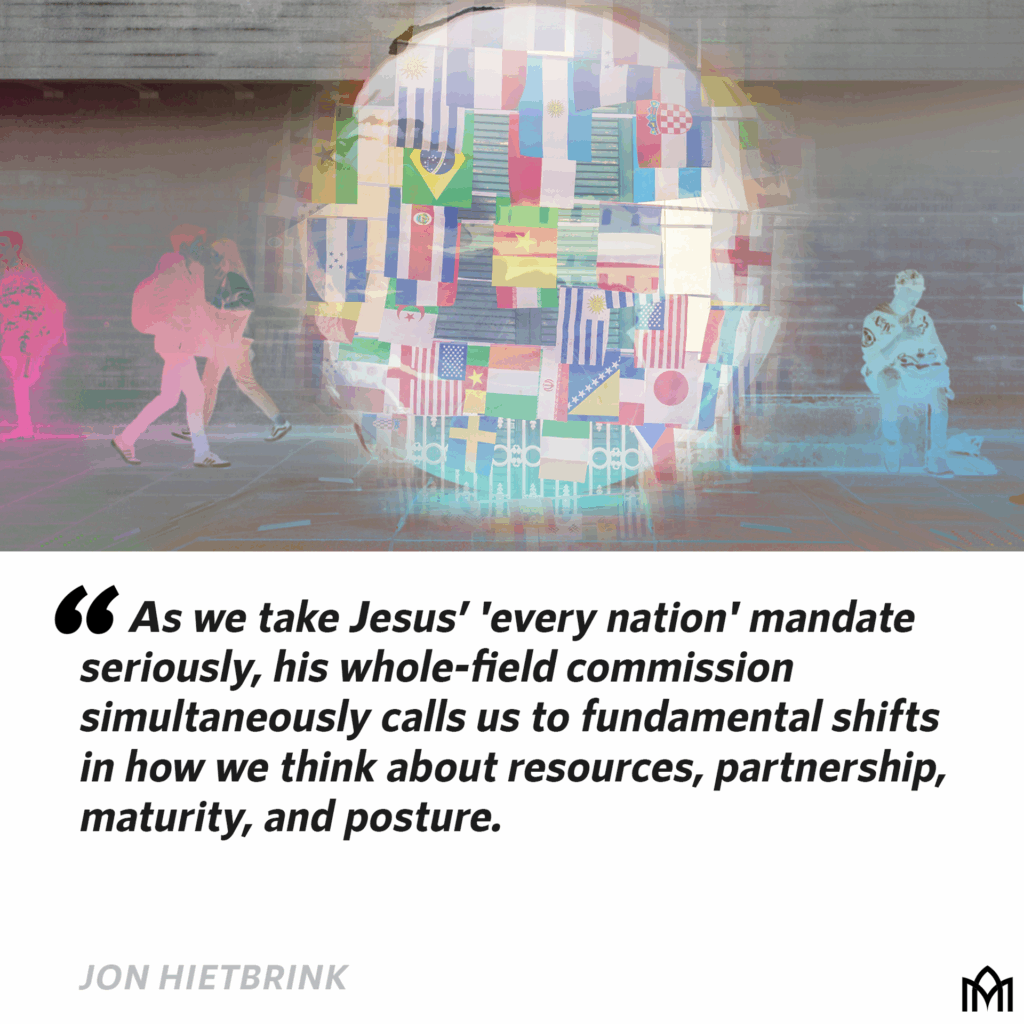Jesus’ Whole Field Mission
It is NOT what I would have said.
As the disciples journeyed back to Galilee–“to the mountain where Jesus had told them to go” (Matt. 28:16)–they were walking through a landscape of memory. Their journey from Jerusalem to Galilee would have taken them past not only places they would have known as children, but also sites of life-changing encounters where they followed in the footsteps of their Teacher and Lord who had now (Somehow!) been raised from the dead. As the disciples reached the foot of the mountain to begin their ascent, they were surrounded by an atmosphere that was simultaneously electric with anticipation and clouded with uncertainty.
Matthew’s account of Jesus’ ‘Great Commission’ (Matthew 28:16-20) includes details that give us insight into both the collective disorientation of the disciples and the incomparable genius of Jesus.
For example:
- “Then the eleven…” (Matthew 28:16a).
Eleven. Not dozens, hundreds or thousands; indeed, not even twelve, but eleven.1Judas Iscariot, having betrayed Jesus, was now dead, having killed himself.
After three years of unprecedented, Spirit-infused ministry, Jesus’ “core team” not only hadn’t experienced exponential growth, it had contracted. Though it might contrast with our assumptions, it is critical to remember that Jesus’ commission is not given to a people riding a wave of wildly successful missional acceleration. By stark contrast, it is instead offered to a fledgling community of faith wrestling with their failures and struggling to survive.
- “When they saw him, they worshiped him; but some doubted.” (Matthew 28:17).
Worship and doubt.
Despite all they have experienced together, this isn’t a community of spiritual alignment. Rather, their strikingly disparate responses to the resurrected Jesus suggest that they are marked more by contrast than cohesion. Whether the very real memory of Judas’ betrayal only weeks ago, or the ways that memory echoed their own very real stories of failure, the eleven disciples on the mountain with Jesus were nothing if not a mixed bag.
As the disciples ascend this mountain of promise on the cusp of receiving a history-altering commission, they bring their faith, but it’s a faith marked by failure. They bring their worship, but it’s worship laced with doubt. They bring their hope, but it’s hope seasoned by uncertainty.
It’s a situation that–if we’re honest with ourselves–feels all too familiar, doesn’t it?
- “Then Jesus came to them.”(Matthew 28:18a).
I’ve always imagined this exchange occurring in a relatively compact setting, almost like a pre-game speech from a coach in the locker room. Matthew, however, paints a different picture, one that starts with an apparently not-insignificant measure of space between the disciples and Jesus.
At some point in their journey up the mountain the disciples see Jesus, but rather than proceeding to be near him, they stay at a distance. Whether from awestruck reverence or agnostic uncertainty, they stop short of drawing near to Christ and choose to leave a gap between where Jesus is and where they are.
Jesus, however, will not settle for a gap, and in spite of their ambivalence and uncertainty, Christ came to his disciples–right where they were, just how they were–because the commission he was about to give was not about them, it was about him.
- “All authority in heaven and on earth has been given to me. Therefore go and make disciples of all nations, baptizing them in the name of the Father, and of the Son, and of the Holy Spirit, and teaching them to obey everything I have commanded you. And surely, I am with you always, to the very end of the age.” (Matthew 28:18-20).
Of course, Jesus’ ‘Great Commission’ is a cornerstone of missional history. However, it’s only as we truly appreciate the disorienting context and disparate community to which Jesus spoke these words, that we begin to see the apostolic genius of Jesus on full display (and how it challenges our status quo). Two insights immediately spring to mind:
-
- First, it’s striking to consider that Jesus determines his mandate not by who they are, but who he is. The authoritative source of mission is not their competency, but his sufficiency. Though they are marked by doubt and failure, the scope of his mandate is not dependent on their authority, but his. Because his authority knows no bounds, neither does the scale of their mission. There is no person they will meet whom he is not already pursuing, and no power of evil they will confront that will not one day bow to his authority. There is no day they will live that is not saturated with his person, and no place they could go beyond the boundaries of his presence.
-
- Second, it’s arresting to note that Jesus defines the priority of mission not by what is already, but by what is not yet. Through his command to “make disciples of every nation” Jesus relocates the starting place of mission from what already exists to what doesn’t. Though “every nation” certainly includes the remnant of believers in Judea, their fundamental priority and their first responsibility is not the community of faith that already exists, but the disciples of every nation who don’t. Because he is the Lord the harvest who cares about the whole field, Jesus’ commission is an invitation to allow our hearts to be as inclusive as his. It’s a call to allow our leadership of what already exists to be fundamentally shaped by what doesn’t.
I have to admit, this is not what I would have said.
For most of my ministry life, I’ve done the opposite of what Jesus empowers in his commission. I’ve made a habit of defining my ministry scope almost exclusively in terms of what is already, and my bias has been toward the middle, not the margin. I’ve regularly prioritized the needs of what already exists to the expense of what doesn’t yet. All too often, my ministry has betrayed massive blind spots that I now see with hindsight were fundamentally at odds with the commission Jesus gave his disciples. Too often, my focus on what already exists has compromised my ability to see nearby communities without a contextual gospel witness or people (particularly People of Color) who were NOT in the room. As any leader can attest, it’s easy to find ourselves so busy managing what is that we fail to even consider what is not yet.
It’s only as we begin to take Jesus’ ‘every nation‘ mandate seriously that we start to see his apostolic genius on full display. Indeed, his whole-field commission calls us to fundamental shifts in how we think about resources, partnership, maturity, and posture.
Christ came to his disciples–right where they were, just how they were–because the commission he was about to give was not about them, it was about him. Share on X
Resources: From Scarcity to Abundance
I’ve rarely encountered a ministry that felt over-resourced. I’m not sure I’ve ever heard a pastor say, “You know, we just have too many volunteers, too much money, or more staff than we can handle.” Indeed, every ministry leader knows the ways we are constantly battling scarcity. Typically, we manage this scarcity by assuming that missional expansion is a product of abundance (i.e. “We’ll plant that church or start that ministry once we have enough _____”). However, in the whole-field missiology of Jesus, he makes clear that expansion isn’t a product of abundance, but rather, abundance is the product of expansion. It’s as we lift our eyes to every nation that we begin to experience the truth that the harvest really is plentiful, and that “the resources for the harvest are in the harvest.”2I first heard this quote from Neil Cole, author of Organic Church.
Partnership: From Competition to Collaboration
When our primary concern is with trying to grow what we’ve got, it’s easy to cultivate a competitive spirit with other churches or ministries. Though we’d be loathe to admit it, many of us are aware of the subtle ways we position our ministry over and against other ministries in an attempt to “win” allegiance from members or volunteers. However, when we have eyes to see the whole field and prioritize communities that haven’t yet been reached instead of competing for the same constituents, we begin to recognize the reality that missional collaboration is essential for Kingdom expansion. By God’s grace, more and more collective impact organizations are emerging around the world. A prime example in my work with InterVarsity is the EveryCampus movement, which is a coalition of more than 130 collegiate and college-adjacent ministries collaborating together to ensure that there is no campus left in the US without a gospel-centered community, no matter who’s name is on it.
As we take Jesus’ 'every nation' mandate seriously, we see his apostolic genius on full display. His whole-field commission calls us to fundamental shifts in how we think about resources, partnership, maturity, and posture. Share on X
Maturity: From Addition to Multiplication
When we consider the gap between 11 disciples on a mountain in Galilee and Jesus’ every nation commission fulfilled in Revelation 7, we quickly realize that Kingdom mission requires multiplication. Far too often, leaders can define “growth” as the goal for disciples, ministries, or churches. To be sure, growth is important, but biologically and biblically, healthy things don’t just grow, they multiply. Just as no farmer would be content with a crop that produced growth without a harvest, so too must we shift our understanding of maturity to be fundamentally multiplicative. The true sign of a mature disciple is not merely spiritual growth, it’s another disciple. The true impact of a leader isn’t more followers, it’s more leaders. The true fruit of a mature church isn’t a bigger crowd, it’s another church. Multiplicative ministry is the only way to pursue a whole field mission.
Posture: From Control to Humility
Though it feels counter-intuitive, the genius of Jesus’ Great Commission is that it was not only a strategy to accelerate missional expansion, but also a strategy that resulted in the spiritual wellness and flourishing of his followers. Instead of a mission that was neatly defined by their capacity, a reality which can easily translate into unhealthy control and self-reliance, Jesus’ disciples were under no illusion that what he was calling them to far exceeded anything they could ever hope to accomplish on their own. Instead of an unhealthy bondage to over-functioning responsibility, mission in the way of Jesus unleashed a buoyant humility in his disciples as they were compelled to trust not in their own power and competency, but in his presence and sufficiency.
///
Where to Begin?
Though it’s not what I would have said, the missiological genius of Jesus’ every nation commission continues to invite us to embrace new wineskins of mission in each generation. How might you embrace Jesus’ whole field mission through the ministry you lead? Here’s a few ideas to get you started:
- Make an “every nation” list for your context (and be specific!). Perhaps it’s found the neighborhoods of your city or the departments of your business, but what would Jesus’ every nation commission look like in your context?
- Once you have your “every nation” list, start showing up in those spaces to pray and explore for God is already doing there (thankfully, God is not waiting for us to show up, but is already at work!)
- If you’d like to go deeper into a simple model that undergirds Jesus’ every nation commission and can help you become an everyday missionary, check out our new book Reviving Mission: Awakening to the Everyday Movement of God.
///
It’s striking to consider that Jesus determines his mandate not by who they are, but who he is. It’s arresting to note that Jesus defines the priority of mission not by what is already, but by what is not yet. Share on X




